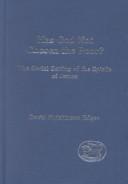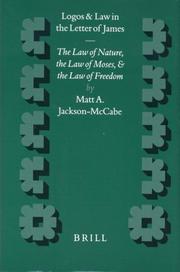| Listing 1 - 2 of 2 |
Sort by
|

ISBN: 1841271829 9781841271828 Year: 2001 Volume: 206 Publisher: Sheffield Sheffield Academic Press
Abstract | Keywords | Export | Availability | Bookmark
 Loading...
Loading...Choose an application
- Reference Manager
- EndNote
- RefWorks (Direct export to RefWorks)
The significance of the Epistle of James within early Christianity, when not neglected, has been disputed. In recent years the letter, and its author, have received renewed attention, and this contribution to the revival examines the way in which the author and his addressees are depicted within the social world of emerging Christianity. Edgar finds strong points of contact with the sayings of Jesus and with early Christian itinerant proclaimers, who are often seen as having been active in preserving and transmitting these sayings. The Epistle challenges the shaky commitment of its readers to
Bible NT. Catholic epistles. James --- Bible --- Social scientific criticism --- Criticism, interpretation, etc --- 227*21 --- Brieven van Jacobus en Judas --- Bible. N.T. James -- Criticism, interpretation, etc. --- Bible. N.T. James -- Social scientific criticism. --- Bible. N.T. James. --- Religion --- Philosophy & Religion --- Christianity --- 227*21 Brieven van Jacobus en Judas --- Bible. --- Epistle of James --- Epistle of St. James --- Jakobusbrief --- James, Epistle of --- Sobornoe poslanie Svi︠a︡togo Apostola Iakova --- Yagobo-sŏ (Book of the New Testament) --- Yagobosŏ --- Criticism, interpretation, etc. --- Social scientific criticism.

ISBN: 9004119949 9004267514 9789004267510 9789004119949 Year: 2001 Volume: 100 Publisher: Leiden ; Boston : Brill,
Abstract | Keywords | Export | Availability | Bookmark
 Loading...
Loading...Choose an application
- Reference Manager
- EndNote
- RefWorks (Direct export to RefWorks)
This study examines the association of 'implanted logos ' and the 'perfect law of freedom' in the Letter of James. It argues that James understands the Torah to be a written expression of the divine law the Stoics correlated with human reason. After showing how past interpretation of James's logos has been guided by a problematic essentialist approach to Christian origins, the Stoic theory of law is reconstructed with special attention to Cicero's concept of 'implanted reason.' Adaptations of the Stoic theory in ancient Jewish and Christian literature are examined, and the Letter of James is analyzed in detail. The work makes original contributions to the study of James and of Stoicism. It also highlights the importance of broad reconstructions of Christian origins for the interpretation of the early Christian literature.
Law (Theology) --- Droit (Théologie) --- Biblical teaching --- Enseignement biblique --- Bible. --- Criticism, interpretation, etc. --- Biblical teaching. --- Droit (Théologie) --- 227*21 --- 227*21 Brieven van Jacobus en Judas --- Brieven van Jacobus en Judas --- Epistle of James --- Epistle of St. James --- Jakobusbrief --- James, Epistle of --- Sobornoe poslanie Svi︠a︡togo Apostola Iakova --- Yagobo-sŏ (Book of the New Testament) --- Yagobosŏ --- Theology. --- Theses --- Bible. N.T. James --- Criticism, interpretation, etc --- Law (Theology) - Biblical teaching.
| Listing 1 - 2 of 2 |
Sort by
|

 Search
Search Feedback
Feedback About UniCat
About UniCat  Help
Help News
News